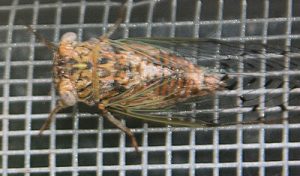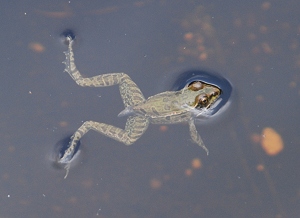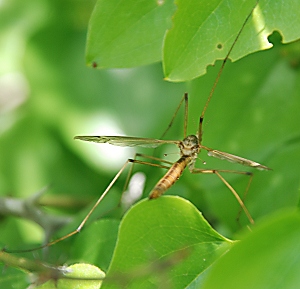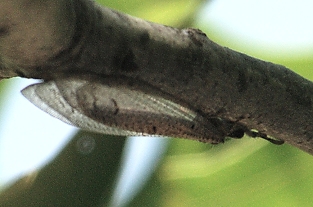Jun 02
Posted: under Activities, photography, Wildlife.
Tags: Activities, census, documentation, photography, wildlife management June 2nd, 2017
Yesterday morning as I went outside, I saw a very small cicada on the kitchen storm door. I thought immediately of one seen some years back (turned out to be four years) in the same place, photographed then and identified by Bill Reynolds, an expert on cicadas at BugGuide.net. First I went back inside and […] [...more]
Yesterday morning as I went outside, I saw a very small cicada on the kitchen storm door. I thought immediately of one seen some years back (turned out to be four years) in the same place, photographed then and identified by Bill Reynolds, an expert on cicadas at BugGuide.net. First I went back inside and got the camera, then photographed it, then went to BugGuide to compare…and sure enough, it’s the same critter. Length about 1/2 inch (not counting wings.)
 Pacarina puella Little Mesquite cicada
Pacarina puella Little Mesquite cicada
Read the rest of this entry »

May 24
Posted: under Activities, Climate Change, Water, Wildlife.
Tags: Activities, amphibians, Animal behavior, beauty, documentation, observation, photography, wildlife management May 24th, 2010
Young Rana berlandieri with last of its tail showing. [...more]
 Young Rana berlandieri with last of its tail showing.
Young Rana berlandieri with last of its tail showing.
Read the rest of this entry »

Apr 30
Posted: under Activities, photography, Wildlife.
Tags: beauty, documentation, insect, new species, photography April 30th, 2010
Crane flies are odd insects with long legs relative to their body size–they’re mistaken sometimes for giant mosquitos, which they aren’t. For such delicate looking creatures, they’re important in the ecosystem: crane fly larvae feed mostly on fungi, decaying organic matters, sometimes on plant rootlets–some are predatory. The adults are food for birds. There are […] [...more]
Crane flies are odd insects with long legs relative to their body size–they’re mistaken sometimes for giant mosquitos, which they aren’t. For such delicate looking creatures, they’re important in the ecosystem: crane fly larvae feed mostly on fungi, decaying organic matters, sometimes on plant rootlets–some are predatory. The adults are food for birds. There are roughly 1600 species of these guys north of Mexico.
Here’s one of our craneflies I’ve seen just about every year:
 Read the rest of this entry »
Read the rest of this entry »

Jan 22
Posted: under Activities, Officialdom, Politics.
Tags: Activities, annual report, documentation, Politics January 22nd, 2010
Every year we have to file an annual report with our county tax appraisal district. We have to use the TPWD form, which–being written for much larger properties mostly focused on game animals–doesn’t really fit us. So every year, in addition to filling out the state’s 9 page form, I write “Please see attached supplemental […] [...more]
Every year we have to file an annual report with our county tax appraisal district. We have to use the TPWD form, which–being written for much larger properties mostly focused on game animals–doesn’t really fit us. So every year, in addition to filling out the state’s 9 page form, I write “Please see attached supplemental pages” many times and then devise a supplement that goes through the same required activities from our perspective, with pictures. In detail sufficient to prove that yes, we are doing everything we say we’re doing, and yes, what we’re doing does fit the requirements. Read the rest of this entry »

Jun 13
Posted: under Activities, photography, Wildlife.
Tags: Activities, beauty, documentation, identification, insect, odonates, photography June 13th, 2009
Besides the pretty pictures aspect (and I enjoy the pretty pictures, both taking them and seeing them online), photography has multiple uses that support wildlife and land management. For instance…I’m almost at the pond and a weakly-flying near-dragonfly-sized insect flies up and lands on the underside of a small limb. I can’t, with my eyesight, […] [...more]
Besides the pretty pictures aspect (and I enjoy the pretty pictures, both taking them and seeing them online), photography has multiple uses that support wildlife and land management. For instance…I’m almost at the pond and a weakly-flying near-dragonfly-sized insect flies up and lands on the underside of a small limb. I can’t, with my eyesight, see it clearly. I know it’s not a dragonfly, butterfly, or moth, but what is it? If I get too close it will fly away.
Enter the camera with a zoom lens:
 Read the rest of this entry »
Read the rest of this entry »





